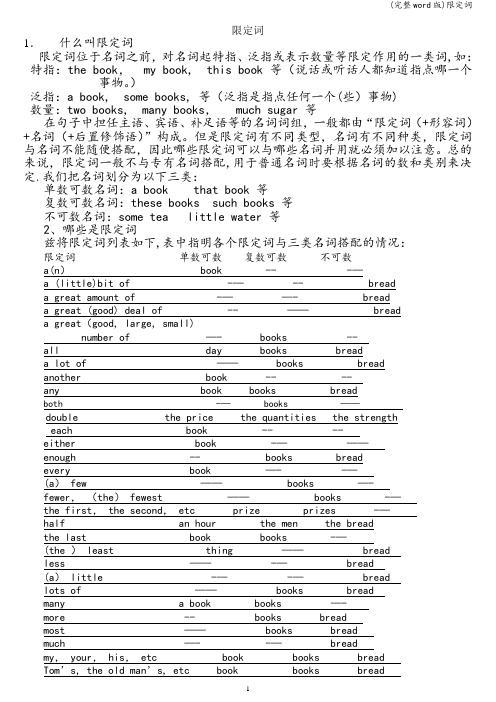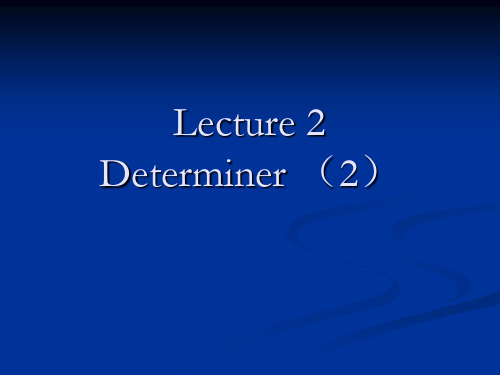限定词2
(完整word版)限定词

限定词1.什么叫限定词限定词位于名词之前,对名词起特指、泛指或表示数量等限定作用的一类词,如:特指:the book, my book, this book 等(说话或听话人都知道指点哪一个事物。
)泛指:a book, some books, 等(泛指是指点任何一个(些)事物)数量:two books, many books, much sugar 等在句子中担任主语、宾语、补足语等的名词词组,一般都由“限定词(+形容词)+名词(+后置修饰语)”构成。
但是限定词有不同类型,名词有不同种类,限定词与名词不能随便搭配,因此哪些限定词可以与哪些名词并用就必须加以注意。
总的来说,限定词一般不与专有名词搭配,用于普通名词时要根据名词的数和类别来决定.我们把名词划分为以下三类:单数可数名词:a book that book 等复数可数名词:these books such books 等不可数名词:some tea little water 等2、哪些是限定词兹将限定词列表如下,表中指明各个限定词与三类名词搭配的情况:限定词单数可数复数可数不可数a(n) book -- -—a (little)bit of -— -- breada great amount of -——- breada great (good) deal of -- —— breada great(good, large, small)number of —- books --all day books breada lot of —— books breadanother book -- --any book books breadboth -— books ——double the price the quantities the strengtheach book -- --either book -———enough -- books breadevery book —- -—(a) few —— books —-fewer,(the) fewest —— books -—the first, the second, etc prize prizes -—half an hour the men the breadthe last book books -—(the ) least thing —— breadless —— -— bread(a) little -— -— breadlots of —— books breadmany a book books —-more -- books breadmost —— books breadmuch —- -— breadmy, your, his, etc book books breadTom’s, the old man’s, etc book books breadneither book -- --the next book books --no book books breadone book ———-one-third, two—fifths, etc (of)the book (of) the books the timeother student students breadthe other book books --plenty of —- books breadseveral -- books --some (某一)book books breadsuch book books breadthat book books breadthe book books breadthese -— books —-this book -— breadthose -- books ——twice, three times, etc the figure the quantities his strengthtwo, three, etc —- books --what(ever) book books breadwhich(ever) book books breadwhose book books breadzero(不用冠词或其它限定词) man men bread[注] 表内“-”表示有关限定词不能与该类名词搭配.限定词的搭配 1、概说名词词组中,当两个或两个以上的限定词同时出现时,限定词之间有一定的搭配关系,根据其不同的搭配位置可分为三类,其中最重要的一类是中位限定词,:Write your answer on every other line。
限定词及不定限定词具体用法搭配详解

,.限制词( determiner)限制词是在名词词组中对名词中心词起特指、泛指、定量或不定量等限制作用的一类词。
一、英语限制词种类1.定冠 ,不定冠 ,零冠。
如: the, a2.名属格。
如:my friend ’s, Tom ’s⋯3.物主限制。
如 : my, your ⋯4.指示限制。
如: this, that, these,those, such ⋯5.疑限制。
如: what, whose, which⋯6.关系限制。
如: which, whose ⋯7.不定限制。
如: some, any, each, every, either, neither, all8.数 (基数、序数、倍数、分数 )9.量。
如: a lot of, lots of ,a great/good deal of ,a great/large/good number of⋯,.二、限制与三名的搭配关系限制按它意可分特指限制、泛指限制、定量限制、不定量限制四大。
四限制有的能与数、复数可数名搭配,也可与不行数名搭配1 )能与三名搭配的限制主要有:the; my, John’ s,the old man’ s⋯; some, any, no,all, other, such, what(ever), which (ever), whose⋯eg. the book----the books----the money,my book----my books----my moneyJohn ’ s book--- John’ s books---- John’s money2)能与数名搭配的限制。
如:a (n) , each, every, another,either ,one,neither, many a,such a (n)⋯eg. each worker , every student, either book , another book3)能与复数名搭配的限制。
限定词(二):数量限定词与个体限定词

限定词(二):数量限定词与个体限定词 数量限定词(一):a few, few/al ittle, little数量限定词(二):some/any个体限定词(一):each/every与名词的搭配关系肯定/否定之别与only或very的搭配关系从与名词的搭配来看,a few和few的后面只能接复数名词,而a little和little的后面只能接不可数名词。
例如:a few days, few boys ; a little water, little money从肯定及否定的角度来看,a few和a little的意思是肯定的,相当于s ome,表示“有一些”的意思。
而few和little的意思是否定的,表示“很少,几乎没有”。
只能说:only a little或only a few,而不能说:only few*或o nly little*。
但为了强调否定意义,我们可说:very few或v ery little。
与名词的搭配关系特殊用法一:any与单数名词搭配特殊用法二:some与单数名词搭配从与名词的搭配来看,some和any均可以与不可数名词及可数名词复数连用,表示“一些”。
s ome一般用在肯定句中,而any一般用在否定句中。
在疑问句中,我们多数情况下用any,但是在表示我们期待一个正面的回答或要鼓励对方说“是”时,要在疑问句中用some。
例如:Havey ou got any medicine to cure your cough?你吃治疗咳嗽的药了吗? Would you like tog ive me some advice?你想给我提点建议吗?当any的后面接单数名词时,它的意思是“无论哪一个,任何一个”,此时可用于任何类型的句子。
You can catch any bus. They all go to the railway station.你坐哪辆公共汽车都行,它们都到火车站。
代词和限定词2

例题
Tell ____ you like. It makes no difference to me. A.whomever B. whoever C. whichever D. however You’re responsible to _____ is in charge of sales. A. whomever B. however C. whoever D. whatever [规则六] 当句子主语为 +人称代词时, 只要人称 代词出现在主语位置, 用主格形式. 例如: Nobody but she can solve our problems. Nobody can solve our problems but her. Everybody except he agreed to our proposal. Everybody agreed to our proposal but him.
[规则四] 关系代词who或that出现在one of those who/that 结构中时, 其先行词是those, 因此代词用复 数. 当关系代词出现在the only one of those who/that结构中时, 其先行词是one, 代词则用复数. 例 如: He is only one of our customers who like their shirts starched. He is the only one of our customers who likes his shirts starched. 例题 1. John is one of those people who go out of _____ way to be helpful. A. his B. one C. ones D. their 2. He is _____ of those boys who is willing to take on another assignment. A. the only one B. only one C. one D. a
限定词2

季节名称之前如果是表示某季节的性质, 通常用零冠词;如果表示特定的阶段,用 定冠词: If Winter comes, can Spring be far behind? The Ching Dynasty in China was overthrown in the Autumn of 1911. night, day, morning等词用法相似。 morning等词用法相似。 在“by+交通工具”这样的结构中用零冠词: by+交通工具” I go t) 习惯用定冠词 at the hands of, on the shoulder, shoulder, by the way, on the spot在现场, spot在现场, for the time being, on the whole, in the case of至于…, (the) day before yesterday, of至于… in the distance, the other day, in the east of, under/in the circumstances, in the end of, to be in the habit of, in the front of在前部 of在前部 to bring down the house博得满场喝彩 house博得满场喝彩 in the possession of 为…所有, to follow the plough务农,in the shade逊色, plough务农,in shade逊色, to get/gain the pupper hand of, on the way, to go by the board被丢弃,on the job忙碌着 board被丢弃,on job忙碌着 to take the fancy of 引起…的注意,to tell the truth, 引起…的注意,to to turn/tip the scale(s)起决定性作用,on the right/left scale(s)起决定性作用,on
英语语法课件 05 限定词(2)

eg: What’s on the radio? How’s the cough today? Shut the door , please. She asked, “Why is Father out of work?” He was elected chairman of the students’ union.
Articles ——Anaphoric, cataphoric and situational reference
Situational reference is a kind of definite specific reference that depends not on any referent that has occurred in the content but solely on the common knowledge shared by speaker and hearer or on a specific situation in which the reference is made clear. Situational reference is most commonly denoted by the definite article, but in certain situations the same function can also be performed by zero
Articles ——Generic reference
In certain contexts, the definite article followed by a singular count noun often performs a generic function. The same function .The same function can also be performed by the definite article combining with certain adjectives or adjectival participle
lecture2 限定词(二)

⑹专有名词前带有表示职业的词语或限制性 修饰词时,要用the。 ⑺海洋、江河、海湾、山脉、群岛、沙漠、 以复数形式出现的地理名称、带有of词组的 岛名,一般要用the。
⑻组织、机关、机构、公共建筑、车船等名 称前,大多用the。 ⑼许多报纸、杂志名称前带the。
⑽度量衡名称之前常用the。
4、何时不用冠词
⑺ 大多数地名、湖泊名称、道路、广场、 车站、机场、公园、桥梁名称、节假日 名称前不用冠词。 ⑻职位、职称、官阶、职业等名称,疾 病名称,餐食名称之前不用冠词。 ⑼在一些固定介词搭配中不用冠词。例 如:face to face, arm in arm, hand in hand, shoulder to shoulder, side by side, inch by inch, day after day
4)man:泛指整个人类时,不用冠词。例如: ①Man can conquer nature. ②From early times man has used garlic (大蒜). Through the years man has tried to cope with (处 理) the smell of garlic. But no herb, mouthwash, chewing gum, or toothpaste seems to help much. ③That’s one small step for a man, one giant leap for man. 5)history:泛指人类整个历史时,不用冠词。 例如: ①History may repeat itself. ②Throughout history man has had to accept the fact that all living things must die.
初中英语语法专题(三)限定词(二)()

专题三第三讲限定词(二)在英语中,限定词是在名词词组中对名词中心词起特指、泛指(冠词),表示确定数量(数词)和非确定数量(不定代词)等限定作用的词类.名词词组除有词汇意义外,还有其所指意义, 是特指(即指特写的对象〕,还是泛指(即泛指一类人或物〕;是有确定的数量,还是没有确定的数量.表示名词的非确定数量的不定限定词有(不定代词):n o, some, any, each, every, enough, either, neither, all, both, half, several, many, much, (a) few, (a) little, other, another 等.接下来我们分类一一讲解。
数量限定词(一): a few,few/a little,little(四个小不点)与名词的搭配关系: a few 和few 的后面只能接复数名词,而 a little 和little 的后面只能接不可数名词。
例如: a few days, few boys a little water, little money肯定/否定之别: a few 和a little 的意思是肯定的,相当于some,表示“有一些”的意思。
而few 和little 的意思是否定的,表示“很少,几乎没有”。
例如:His theory is rather difficult; few people understand it.=His theory is rather difficult; almost no people understand it. 他的理论很深奥,没什么人能够理解。
His theory is rather difficult, but a few people understand it. 他的理论很深奥,但有一些人能够理解。
Ihave little interest in English, so I am very poor at it. 我对英文没什么兴趣,所以学得很不好。
- 1、下载文档前请自行甄别文档内容的完整性,平台不提供额外的编辑、内容补充、找答案等附加服务。
- 2、"仅部分预览"的文档,不可在线预览部分如存在完整性等问题,可反馈申请退款(可完整预览的文档不适用该条件!)。
- 3、如文档侵犯您的权益,请联系客服反馈,我们会尽快为您处理(人工客服工作时间:9:00-18:30)。
Le déterminatif (II)I.Les adjectifs possessifsFormes : me, te, se...Emploi :Je vais aller au cinéma avec mes amis.C’est Nicole et son mari Pascal.Le père le prend à la main. ( à la = à sa main).Elle le saisit au collet.Ce col est très étroit, ça me gêne le cou.Attention : Elle ouvre ses yeux immenses.pronom indéfini ou impersonnel : on, personne, chacun, nul, il fait...Chacun son goût.On a sa fierté.Il faut laver son linge sale en famille.Nul n’est satisfait de son état.Il est bon de connaître ses limites.Exprimer une habitudeIl gagane ses 2000 euros par mois.Il travaille ses dix heures par jours.II.Les adjectifs démonstratifs.Formes : ce, cet, cette, ces✧= quel, pour exprimer une surprise ou une haineTu demandes pourquoi je viens ? Cette demande !Il veut que je vienne. Cette idée !Formes : ce...-ci, ce...-là ...Je prefère cette voiture-ci à cette automobile-là.✧Ces huîtres-là ne sont pas fraîches.III.Les adjectifs interrogatifs et exclamatifsFormes : quel, quelle, quels, quellesQuelles langues parlez-vous ?Quel feuilleton avez-vous vu cette semaine ?Quel est l’impact de ces nouveaux médias sur la façon de s’informer ?Attention : vrai ou faux – Quelle chose avez-vous, M. Martin ?Exclamatifs :Quelle joli jardin !Quelle est votre erreur !Quel plaisir de te voir !IV.L es adjectifs indéfinis和ne一起,省略句中在介词sans或连词sans que后,表“没有一个...”Aucune femme n’est indifférentes à sa beauté physique.Quel que soit le lieu de votre stage, vous ne toucherez aucune rémunération.Avez-vous reçu des nouvelles de votre père ? --- Aucune, ces temps-ci.La numérisation permet de traiter, de stocker et de transmettre les données plus facilement etplus rapidement, sans aucune déperditi on d’information.Nulle chose ne manque.Il n’y a pas un roman dans sa bibliothèque.Attention : Vrai ou faux :Il ne lira plus aucun roman policier.Il n’a pas aucun ami.2.Quelque,单数:表示“某一个”或“某些,少许”;复数:表示“几个”或“若干”等J’ai quelque part une maison très grande.Il avait des talents, quelque savoir.Cette affaire souffre quelque difficulté.J’ai quelques amis au Canada.Attention : Il a quelque cinquante ans.Quelque 1000 innovations techniques ont être introduites.3.Chaque ,表示“每”Chaque membre de la classe donna son avis.Il va au Zhejiang chaque samedi.Attention : comment dire 每两天(两个小时) en français ??4.Touttout(toute) + nTout homme nâit et meurt.Toute jeune fille a rêvé du Prince Charmant.tous(toutes) + nIl est parti et a cessé toutes relations.en tout/tous pays, à tout/tous moment/momentstout(toute)+déterminatif +nIl a plu toute la nuit.Ce n’est pas la peine de nous presser, nous avons tout notre temps.Comment, tu as déjà dépensé tout ton argent ?tous (toutes) + déterminatif +nCe journaliste a recuilli toutes les informations nécessaires à la rédaction de son article.Pour cette soirée, vous viendrez tous les quatre ?tous (toutes) + les + n. exprimant l’heure ou l’unitéVous avez un train toutes les heures.Tous les matins, j’accompagne mes enfants à l’école.Les députés du parlement sont élus tous les cinq ans.tout + n. auteur/villelire tout Maupassanttout Wuhantout, tous, toutes + pronom démonstratifTout ce, toute cela, tout ça :✓Donnez-moi tout ce qu’il y a de mieux.✓Tout ça ne me regarde pas.✓Sa mère connaît déjà tout cela.Tous ceux, toutes celles :✓Il n’y a plus beaucoup de places pour le concert de ce soir. Toutes celles qui restent sont au dernier rang.Attention : tout...ne... pasComment traduire les phrases suivantes en chinois :✓Tous les élèves ne sont pas venus.✓Toute vérité n’est pas bonne à dire.✓Je ne sais pas toutes les langues étrangères.5.même,名词前,表示“同样的”,“相同的“;名词后,表示”自己“,”本身“。
Regarde comme ils se ressemblent : ils ont les mêmes yeux.Attention : 和...一样的 = même ... que... OU même... avec... ?Il fait la même température avec hier. OU Il fait la même température qu’hier.Les directeurs sont venus eux-mêmes.Les Romains vainquirent les Grecs par les Grecs mêmes.Remarque : même comme adverbe✧Alors tout le monde est venu, même Pascal ?✧Venez, même si vous devez partir tôt, ça me fera plaisir de vous voir.6.plusieurs 表示比二大的一个不确定的数字,意思为“几个“,”好几个“Cela fait plusieurs jours que je n’ai pas de nouvelles de Jean. Qu’est-ce qu’il devient ?7.différents, divers ,许多,好些,可指人或物Différentes personnes me l’ont dit.Divers ouvrages traitent de la question.8.certain表不确定,意思为“某一(几)个“Il est venu nous voir avec un certain cousin à lui.Certain jour qu’il pleuvrait, j’étais sorti sans imperméable.9.telun (une) tel (telle), de tels(tells)Comment veux-tu qu’on retrouve quelque chose ici, il y a un tel désordre.Je suis étonné qu’il tienne de tels avis.=certain, sans articleJ’arriverai tel jour, à telle heure, sans telle ville.10.autreDonnez-moi un autre stylo, celui-là ne marche pas.J’ai perdu mes clés, sauf d’entrer par la fenêtre, je ne vois pas d’autre moyen.d’un côté... de l’autre côté11.quelconqueSi, pour une raison quelconque, vous ne pouvez pas venir, prévenez-nous à temps.✧je ne sais quel+n./je ne sais qui/où/pourquoi/combien de/quand etc.Pour parfumer ce gâteau, il faut ajouter je ne sais quelles épices.Il y a je ne sais combien de temps.Il est sorti avec je ne sais qui.Notre départ est décallé à je ne sais quand.Il passe ses nuits je ne sais où.✧n’importe q uel + n.Il veut acheter une villa au bord de la mer à n’importe quel prix.Je me sens capable de surmonter n’importe quelle difficulté.✧n’importe qui/quoi/lequel/comment/quand/oùRassurez-vous, je ne parle du projet à n’importe qui.N’importe lequel d’entre nous.I veut réussir n’importe comment.Venez n’importe quand, je suis chez moi cette semaine.Elle dit n’importe quoi.。
